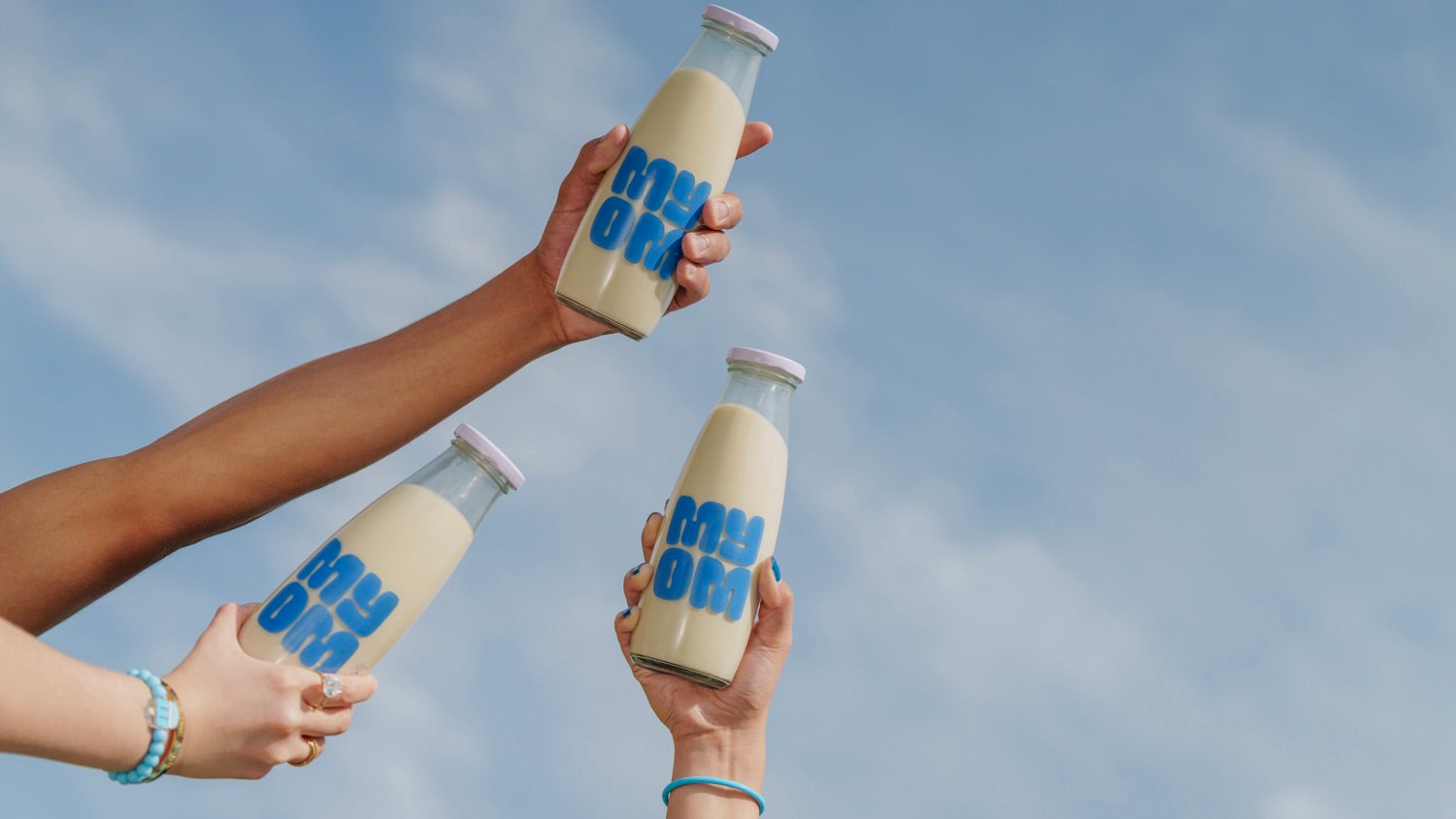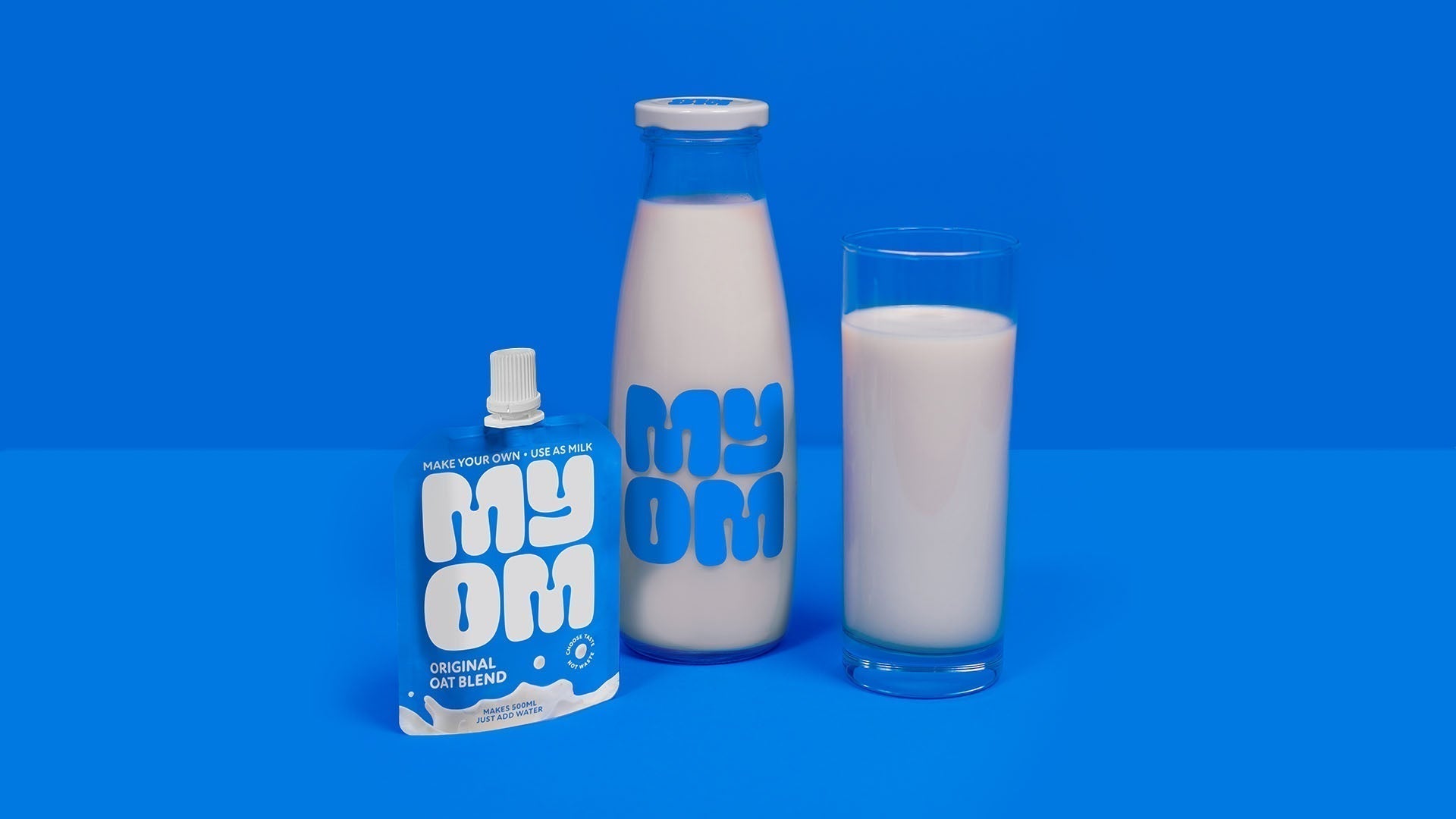Search “is oat milk bad for you?” and you’ll find a mixed bag of opinions. Some claim oat milk is “fattening”, “too sugary”, or “ultra-processed”. Others see it as a plant-based hero — better for the planet and good for your health. The truth? It depends on the oat milk you’re drinking. Not all oat milks are created equal. Many supermarket cartons contain additives like dipotassium phosphate, added oils, or high levels of added sugar. But that’s not the whole oat milk story.
At MYOM, we set out to prove that oat milk can be clean, nutritious, and delicious. The result is an oat drink premix that flips the old model on its head: no unnecessary additives, low sugar, nutrient-fortified, and designed to be better for your body kinder to the planet.
So, is oat milk bad for you? Absolutely not — when it’s made right. Let’s break down the myths, look at the science, and explore why MYOM oat milk is good for you.
Myth #1 – Oat Milk is “Full of Sugar”
Oat milk critics often point to sugar. Because oats are naturally rich in starch, when they’re enzymatically processed into oat milk, some of those starches convert into natural sugars.
The truth about oat milk sugar:
• Most oat milks contain naturally occurring sugars from oats, not spoonfuls of added sugar.
• Some brands, however, hydrolyse their oats to maximise sweetness — which can mean higher sugar content.
How MYOM compares:
• MYOM Original Oat has just 1.9g of sugar per 100ml, naturally occurring from oats.
• That’s less sugar than cow’s milk (which has around 4.7g lactose per 100ml).
• It’s also lower than many leading oat milk brands, which can sit at 3–4g per 100ml.
Takeaway: Low sugar, no added sugar. Oat milk is not bad for you on sugar content — in fact, MYOM is one of the lowest-sugar choices you can make.
Myth #2 – Oat Milk is “Fattening”
Calories matter to many health-conscious consumers. With oat milk, the perception of being “fattening” comes from the use of added oils (often rapeseed or sunflower) to give creaminess.
Calories in oat milk vs. dairy:
• Semi-skimmed cow’s milk: ~47 kcal per 100ml
• Whole milk: ~65 kcal per 100ml
• Typical oat milks: 45–60 kcal per 100ml
• MYOM Original Oat: 34 kcal per 100ml
That’s one of the lowest calorie oat milk options available in the UK.
Takeaway: Oat milk, and especially MYOM, is lighter than dairy — but still creamy enough to use in coffee, cereal, or smoothies.
Myth #3 – Oat Milk Lacks Nutrients
A common criticism is that oat milk is “empty calories” compared to cow’s milk.
The truth about fortification:
Many oat milks are fortified to provide the same essential nutrients found in dairy. The problem? Not all brands fortify equally, and some cut corners.
MYOM fortification:
• Calcium (to support bones and teeth)
• Vitamin D3 (vegan-friendly, supports immunity and calcium absorption)
• Vitamin B12 (essential for energy and red blood cell formation)
• Iodine (for thyroid function and metabolism)
Takeaway: MYOM is wellness in a glass — all the nutrients, none of the downsides.
Myth #4 – Oat Milk is Ultra-Processed
Consumers are rightly wary of “ultra-processed foods” (UPFs). Some oat milks contain a long list of stabilisers, emulsifiers, and phosphates.
Why additives matter:
• Dipotassium phosphate (common in oat milk) can impact kidney health if consumed in large amounts.
• Gums, stabilisers, and emulsifiers can cause digestive discomfort in sensitive individuals.
MYOM’s clean-label promise:
• No dipotassium phosphate
• No preservatives
• No artificial colours or flavours
• No artificial sweeteners
• Phosphate-free
Takeaway: Oat milk doesn’t have to be ultra-processed. MYOM is proof that a clean label and long shelf life can go hand-in-hand.
Myth #5 – Oat Milk Causes Bloating
Some people associate oat milk with bloating.
Why this happens:
• Often it’s the additives (gums, emulsifiers, phosphates) rather than the oats themselves.
• Lactose intolerance — the cause of bloating in dairy milk — doesn’t apply to oat milk.
MYOM advantage:
Because MYOM is free from gums and phosphates, it’s gentler on the stomach. And being lactose-free, nut-free, and soy-free, it avoids many of the common triggers for digestive discomfort.
Comparing Oat Milk and Dairy
When consumers ask, “is oat milk bad for you?”, they often compare it to cow’s milk.
Dairy downsides:
• Naturally higher in sugar (lactose)
• Higher in calories
• Contains saturated fat
• Can cause lactose intolerance symptoms
• Higher environmental footprint
MYOM oat milk benefits:
• Lower sugar and calories
• 0.2g saturates per 100ml (much lower than dairy)
• Nutrient-fortified to match dairy’s benefits
• 80% lighter to ship → lower carbon footprint
• Ambient stable, no fridge required before opening
The Bigger Picture – Sustainability
Health isn’t just about your body — it’s about the planet too.
• Oat milk production has a lower carbon footprint than dairy.
• MYOM takes this further: our pouches are recyclable PP5 mono-material, and each 65g pouch makes 500ml of fresh oat milk.
• That’s up to 80% less packaging and weight than cartons, meaning fewer emissions from transport and less waste overall.
Takeaway: Choosing MYOM is good for you and kinder for the planet.
Key FAQs – What People Search For
Is oat milk inflammatory?
No. Oats contain beta-glucans, soluble fibre known for supporting heart health and reducing cholesterol.
Does oat milk spike blood sugar?
With a glycaemic index lower than many refined carb foods, oat milk digests gradually. MYOM’s low sugar content makes it even more stable.
Is oat milk healthier than almond milk?
Almond milk is often low in calories but also low in nutrients unless fortified. MYOM offers both low calories and robust fortification.
Can children drink oat milk?
Yes — especially fortified oat milk like MYOM, which supports bone development and provides B12 and iodine. Always check with your GP for under-5s.
Is oat milk safe during pregnancy?
Absolutely. Fortified oat milk provides essential nutrients like iodine and calcium that are important in pregnancy.
Conclusion: The Oat Milk That’s Good for You
With MYOM, you’re not just choosing oat milk. You’re choosing:
• A low-sugar, low-calorie alternative to dairy.
• Nutrients your body needs, without the additives it doesn’t.
• Packaging that’s lighter on the planet.
• Award-winning taste recognised by judges and customers alike.
Now that’s something worth raising a glass to.




